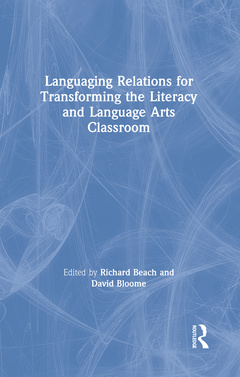Languaging Relations for Transforming the Literacy and Language Arts Classroom
Coordonnateurs : Beach Richard, Bloome David

Applying a languaging perspective, this volume frames the teaching and learning of literacy, literature, language, and the language arts as social and linguistic actions that generate new questions to make visible social, cultural, psychological, linguistic, and educational processes. Chapter authors explore diverse aspects of a languaging framework, the perspective of language as a series of ongoing and evolving interactional social actions and processes over time. Based on their research, the authors suggest directions for addressing substantive engagement as well as the marginalization, superficiality, and violence (symbolic and otherwise) that characterize the educational experience of so many students. Responding to the need to foster and support students? intellectual, social, and affective worlds, this book showcases how languaging relations among teachers and students can deepen interactions and engagement with texts; enhance understandings of agency, personhood, and power relations in order to transform literacy, literature, and language arts classrooms; and improve the lives of teachers and students in educational settings.
1. Introduction: Languaging Relations for Transforming the Teaching of Literacy and the Language Arts Section 1: Languaging Relations and the Interactions of Teachers and Students 2. Reconceptualizing Classroom Life as Relational-Key 3. Portraying and Enacting Trust in Writing in a High School Classroom 4. Languaging, Race, and (Dis)ability: Discerning Structure and Agency in Classroom Interaction Section 2: Recontextualizing Language Learning in the Classroom from a Languaging Perspectives 5. Languaging and Languagised Learning 6. Languaging the Rhetorical Tradition: Pedagogical CHAT in Middle School and College 7. Languaging the Teaching and Learning of Argumentative Writing in an 11th Grade International Baccalaureate Classroom Section 3: Languaging Relations and the Interactions of Readers/Audiences and Text 8. Participatory Sense-Making in Narrative Experience 9. Comprehending as Relational, Dialogic, and Imaginative Activity Section 4: Languaging Relations and Locating Teaching and Learning in the Complex Dynamics of Power Relations 10. Theorizing and Languaging Blackness: Using the African Philosophy of Ubuntu and the Concept of Sawubona11. Mobilizing and Languaging Emotion for Critical Media Literacy 12. Languaging Personhood in Classroom Conversation
Richard Beach is Professor Emeritus of English Education at the University of Minnesota, Twin Cities, USA.
David Bloome is College of Education and Human Ecology Distinguished Professor of Teaching and Learning, and Director of the Center for Video Ethnography and Discourse Analysis at the College of Education and Human Ecology, The Ohio State University, USA.
Our appreciation to Mindi Rhoades, The Ohio State University, for creating the cover art for this book.
Date de parution : 01-2019
15.2x22.9 cm
Date de parution : 01-2019
15.2x22.9 cm
Disponible chez l'éditeur (délai d'approvisionnement : 14 jours).
Prix indicatif 50,12 €
Ajouter au panierThèmes de Languaging Relations for Transforming the Literacy and... :
Mots-clés :
Young Men; David Bloome; Refugee Background Students; Richard Beach; High School International Baccalaureate; languaging; Initiation Response Evaluation Sequence; languaging relations; Smart Phone; translaguaging; Joint Undertaking; critical media literacy; Languaging Practice; composition studies; Instructional Conversations; teaching and learning; Ninth Grade ELA; literacy; Enactive Cognitive Science; language arts; Individual Interview Transcript; personhood; Cutie Pies; agency; Participatory Sense Making; sense-making; Argumentative Writing; literacy research; Translanguaging Pedagogies; Everyday Classroom Interactions; Clip; Dual Language Classroom; Louis Agassiz; Institutional Review Board; IRB; Microethnographic Discourse Analysis; Current Traditional Rhetoric; Storied Worlds



